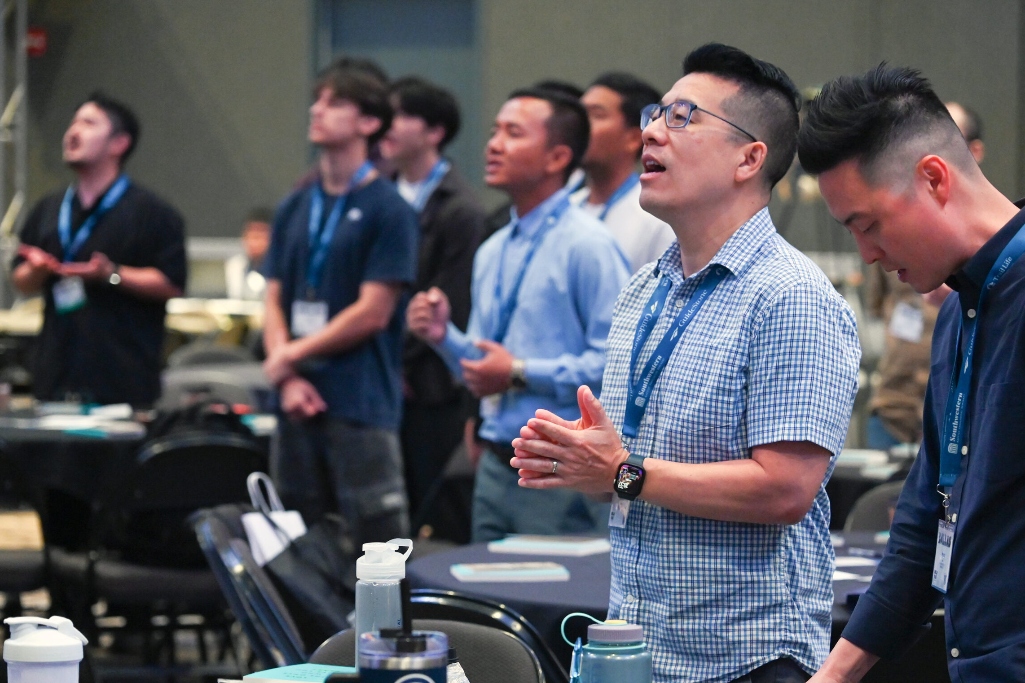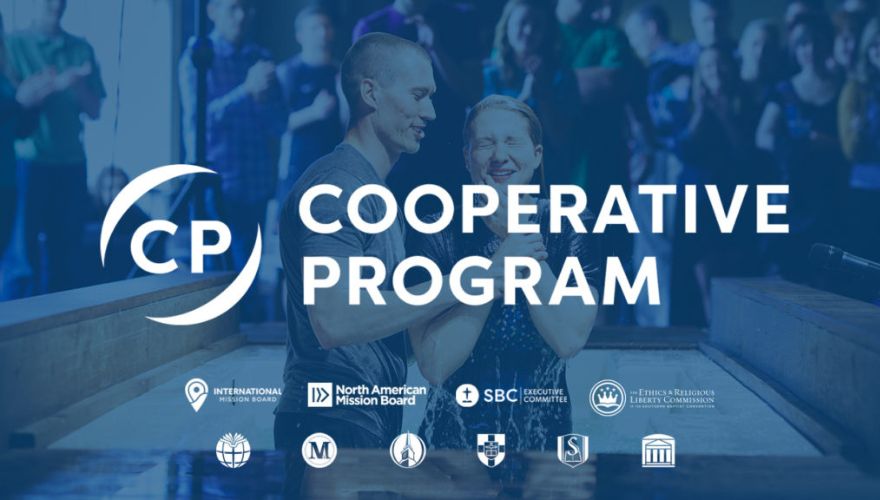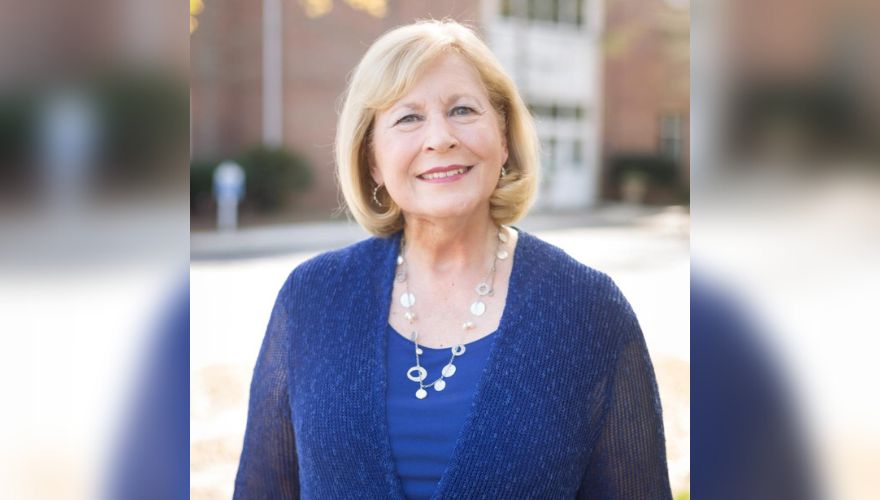
Co-coordinator Terrence Shay, family pastor at First Chinese Baptist Church in Walnut, Calif., worships in the crowd alongside other attendees at the Asian NextGen Pastors Network gathering on June 9 in Dallas, Texas, ahead of the 2025 SBC annual meeting. This year’s theme, “Hope Beyond Hurt: Loving the Local Church,” explored healing from church hurt through gospel-centered wisdom, personal testimony and practical tools for ministry.
DALLAS (BP) — The Asian NextGen Pastors Network addressed “Hope Beyond Hurt: Loving the Local Church” at its fourth annual meeting June 9 ahead of the Southern Baptist Convention (SBC) annual meeting in Dallas.
“If healthy church leaders contribute to healthier churches, then we want to encourage and equip leaders through open discussion,” co-coordinator Hyung Lee, pastor of the multiethnic Living Rock Church in Pasadena, Calif., told Baptist Press (BP).
“We don’t want to avoid subjects just because they might seem taboo in Asian cultures because that would imply the gospel doesn’t speak to all our heart issues, hurts and sins.”
Co-coordinator Terrence Shay, family pastor at First Chinese Baptist Church in Walnut, Calif., explained the reason for this year’s topic.
“In a world where pain, division and disappointment often shape our experiences, the local church can sometimes become a place of hurt rather than healing,” Shay told BP. “Yet, amid the struggle, there is always hope.
“This conference was a joy to plan and participate in given its personal and pastoral nature,” Shay said. “Our deepest questions and hurts were addressed winsomely through God’s Word in the presence of God’s people.”
Brett Inamura, Lilly Park and Jamie Dunlop led the group of about 50 English-speaking Asian pastors in three separate talks and a panel discussion, from discernment of another’s perspective to self-awareness to loving others with God’s love.
Inamura is a doctoral student at Southern Baptist Theological Seminary and co-church planter in the Valley Ranch area of metro Dallas. His eight-year pastorate in New York City provided many of the illustrations that made his points based on 1 John 3: Love one another, consider the needs of others and listen to all viewpoints before making decisions, he said.
Inamura ended with a request based on his experience for older pastors to come alongside younger pastors to help them develop their gifts.
“I know this is a source of hurt among younger pastors,” Inamura said, referring to a lack of mentoring from older pastors. The NextGen pastors know they need to develop their gifts. In order to build the kingdom of God, senior pastors and NextGen pastors need to see and treat each other as equal partners in ministry and co-laborers in the work, he said.
Inamura mentioned passages from Luke and 1 Timothy addressing the importance of fair and adequate compensation for NextGen pastors as well as senior pastors.
Lilly Park, an associate professor of biblical counseling at Southwestern Baptist Theological Seminary, spoke of frustrations Asian pastors might face in part because of their cultural background.
“I’m not doing enough” is a frequent comment she hears, as is, “I’m not pleasing my pastor enough.” Park said she also often hears of issues with difficult parents, with anger, with being a people-pleaser and with being a blame-shifter.
“Are you stuck? Still living in the past? That’s a sign of bitterness,” Park said. “If you continue to see yourself as a victim, you can’t heal.
“Live in the present,” she said. “God is your source of hope.”
There is no perfect church, Park said. There is only a perfect God. Conflict is a part of ministry. It needs to be dealt with in a way that honors God. There is such a thing as righteous anger, but too easily it can slip into an unrighteous anger.
“Before confronting someone, seek the Lord,” Park said. “Forgiveness is not just words. It comes from the heart. Forgiveness means you are letting God be the judge. Forgiveness is more than a feeling. Forgiveness is a commitment.”
Park spoke of a need for the rest that comes from following Jesus, who rested routinely.
“Godly counsel is always consistent with the Bible,” Park said, referring to Galatians 6:1 for instruction in restoring others with gentleness, having a sense of self-awareness and humility, and of love and care for others.
Jamie Dunlop is an associate pastor at Capitol Hill Baptist Church, which is five blocks from the U.S. Capitol building in Washington, D.C., one of the most opinionated cities in the United States, Dunlop said.
In 2023, he wrote the book “Love the Ones Who Drive You Crazy: Eight Truths for Pursuing Unity in Your Church,” which was the topic he chose for the NextGen Pastors Network annual meeting. Copies of the book published by Crossway were given to attendees.
“Christ alone is the path to joy,” Dunlop said. Not Christ-and, because that “and” opens the door to differences, to conflict, to a lack of love.
“How can you love the people who drive you crazy? By the mercies of God, and that’s the whole point,” Dunlop said. “If we continually seek God together, we’ll see how completely we fit together.
“If your church is about Jesus and urban renewal, you’ll rob Him of glory. If your church is about Jesus and children, you’ll rob Him of glory. If your church is about Jesus and anything, you’ll rob Him of glory. May we give God glory due to His name.”
Dunlop spoke from Romans 14 and used the first churches as an example.
“As Scripture makes quite clear, God’s plan for these churches was to be Jew-Gentile from the very beginning. The church in Colossae was both slave and free. The church in Corinth had people who ate meat sacrificed to idols and people who thought this was sin. The churches James wrote to were rich and poor,” Dunlop said.
“Differences of culture, conscience and class — God gets greater glory in redemption than in creation. The people had to learn to be ‘Jesus only’ churches.”
The five-hour event included giveaways from sponsors, worship time and a meal.
“We were blessed by the relevant stories and Scripture wisdom offered by our diverse panel consisting of professors, pastors and seminarians,” Shay said. “Their honest insights resonated with and convicted our hearts with grace and gratitude.
“This event more than doubled the length of previous years in order to go deeper in content and community building,” he said. “We are grateful for a seasoned group of speakers and attendees that sharpened our understanding of church hurt and pointed us to the gospel as the source of true forgiveness and healing.”
(EDITOR’S NOTE — Karen L. Willoughby is a national correspondent for Baptist Press. Chauna Sidwell contributed to this article.)


